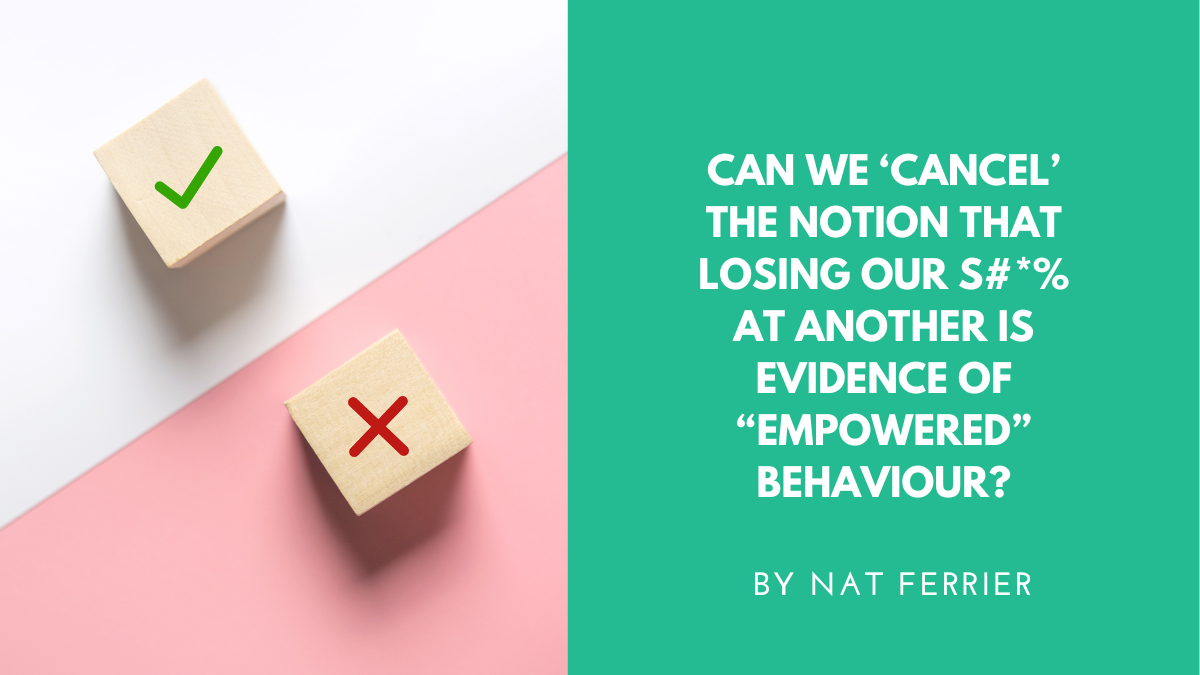Can we cancel the notion that losing our S#*% at another is evidence of empowered behaviour?8/24/2023 We live in VERY stressful, climate & financially challenged post lockdown times. Times in which our sense of personal power, has at times been deeply challenged and tested. Working in front facing settings, unfortunately, it has never been so apparent to those on the front lines, with how frequently people now feel entitled to give unsolicited opinions on how front facing staff should be doing their job, and or with how often people swear at, verbally abuse, negatively gesture at and even swipe or spit at front facing staff, when the customer is asked to do something, or hears something that they didn’t want to, that many people en masse are seemingly struggling with 2 things: 1) a sense of how do I “flex my power muscles” with people in society again in a healthy way. If we detach from the subjective weight of such moments (& the distress that can come from them, and or allow for a touch of metaphorical humour for a moment) I fear that from above, we often look like a bunch of baby goats, playing in the business of life one moment, then suddenly turning to look someone in the eyes, and lining up their head to start “butting things”; mainly other goats. “Flexing” our verbal assertiveness muscles, trying to prove to ourselves that we can? It’s almost comical…until you’re, unfortunately the service person, friend, family member, partner, parent or random stranger on the road or street, that they try and test their verbal head butting skillz on. In Hollywood, we’ve sometimes seen this represented as the person who got burned, standing up to issue an often public burn back, to a soundtrack of the likes of R-E-S-P-E-C-T, followed by a triumphant power walk, combined with a high 5, off stage/screen left. Accompanied by a “YEA-AHH! You showed THEM! 🙌🏻” Other times, I think it’s a measure of us not coping and defaulting more than ever, to a coping strategy of using others for the cathartic relief and release of our distress. While there is a tonne of knowledge out there at our free internet fingertips now on things like stress management, emotional self regulation and effective communication, negotiation and conflict resolution strategies, the fact that they’re not being implemented always right now to reach for a more constructive response, tends to lead me to think one of two main things is going on; either we’re not making the conscious connection as to when to actually use them, IRL. Or, we’re choosing not to? And defaulting at times, back to using the ‘easy’ route, of using the person in front of us as a cathartic target for the release of our emotional discontent. And just expecting them to be ok with it. As opposed to appealing to them positively, as an agent in a mutual negotiation and process of resolution, towards a particular goal, or outcome. Dare I say it that choosing to do this to a service professional (who’s often feeling bound by company policy and HR law) is like lining up to challenge someone who’s hands have been tied behind their back. Instead of lining up with a willing sparring partner, and “fighting fair.” Sadly, I suspect that much of the time when we might think we’re being empowered and standing up for our rights, verbally losing our sh*t at someone, in fact, we actually come off to others looking like tantrummimg toddlers within grown adults. Minus the capacity to self regulate our own emotions, or speak to what we actually need? Which feels far scarier to be on the receiving end of from a grown adult, who may or may not be bigger, taller, heavier and or coming at you in a confined space, than an actual toddler? For Women, dare I say it out loud, owning the proverbial wild woman archetype as one vehicle for tapping our repressed/disempowered rage, and pairing her up with the exploration of the inner warrior/ess, can be powerful for helping us tap, heal and self manage the causes of our own thoughts, past wounds, collective and individual patterns and emotions, in the private time that we dedicate to our own therapy. And as a last line of defence resort in the instance of being physically attacked on the street, can be unbelievably effective in shocking the hell out of and deterring some perp, who was counting on us being too meak and weak, to turn, look them in the eyes and come at them screaming with a deep, guttural angst, and self defence moves, that made impossible a stealthy attack. But the trouble becomes, when losing our sh%# or going warrior, starts to be used as standard as a first like response, instead of a last resort line of defence, in relational settings. In the respect of creating a mutually beneficial outcome through communication and engaging in a way that fosters longevity, “unleashing the fury” actually often proves to be about as useful as a screen door in a submarine when it comes to successfully resolving an issue and getting to the bottom of what both parties really need, beyond all the angst, collective and intergenerational trauma, and trigger that inevitably eventuates, when one or both parties come at each other like this is war. Why? Because It’s one thing to ask the other to listen as we describe that “I felt hurt/let down when this happens/happened,” or “I really appreciate it when you do this for me when I feel….or when this happens”, with a residual residue of that feeling present within is, in the space. But the second we cross the line into asking or just expecting without consent, the other to hold space, while we verbally or physically abuse them and use them as a cathartic punching bag for release of the energy of all the ways in which we’re triggered, I believe we’ve actually crossed the line into the territory of abuse. Which triggers a whole bunch of defensive responses. And often leads the conversation down a whole other path thsn where it needs to go. One of our greatest growth challenges in these stressful times, is learning to recognise the difference between the two…and respond, rather than react accordingly, in situations involving other humans. This is a part of taking self responsibly for regulating our own state and being 50% accountable for doing our part in creating a psychologically safe relational space for us and any given other to share. It’s not ‘nice girl/nice boy people pleasing’ or ‘bowing to the patriarchy’ to learn how to manage our emotions in a healthy way, so that we can relate in a healthy way. It’s a necessary communication and life skill. And if we’re ever going to come even remotely close to succeeding in creating our shared vision of an empowered society without abuse and violence, where we use our personal power, and voices for the greater good, it’s kind of a given that we all need to master this. Period. It’s not just a problem for ‘that one person OUT THERE who had the problem,’ to own THEIR sh#%. It’s all of our jobs to become aware of and take responsibility for how and when we’re all at times playing into these patterns. To learn how to weild our personal power muscles for the greater good . And to learn how to create our own sense of inner safety and manage our own shit long enough, that we can reach deeper, to the heart of what we both really need in any given relational situation. Make sense? Until next time... Nat |
WriterActress, Artist, Singer, Coach, Facilitator, Speaker, Writer Nat Ferrier talks about self expression, Women’s Leadership Mindset & communicating with greater confidence, presence & psychological safety. Archives
March 2024
Categories |


 RSS Feed
RSS Feed